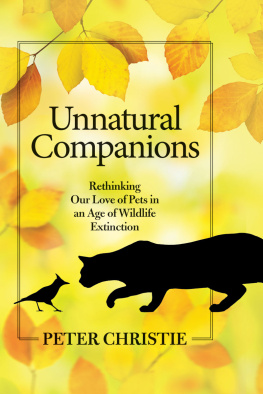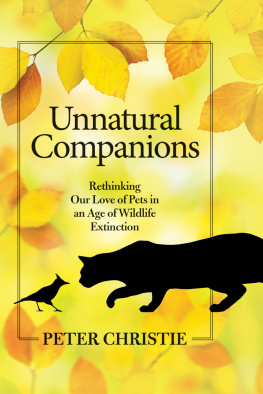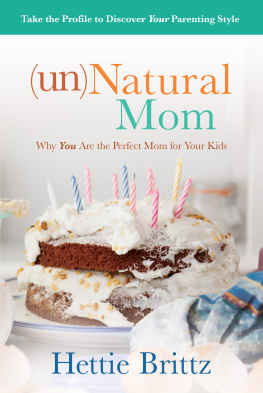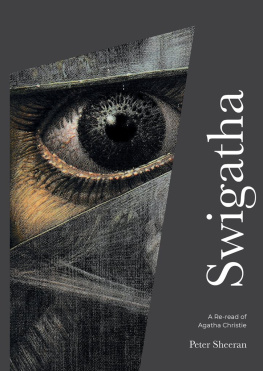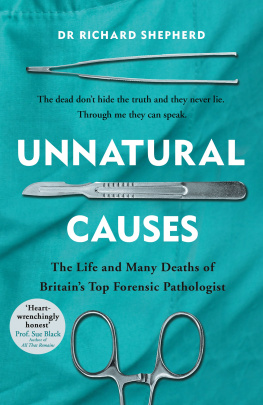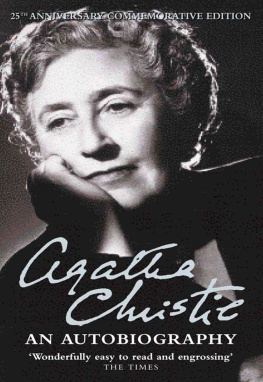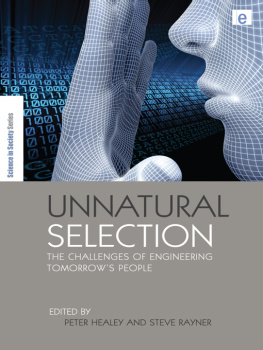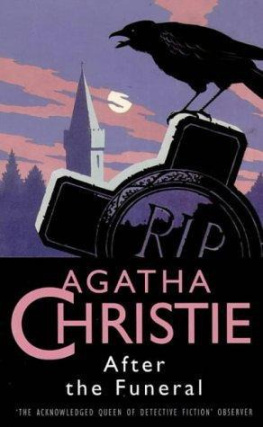Peter Christie - Unnatural Companions
Here you can read online Peter Christie - Unnatural Companions full text of the book (entire story) in english for free. Download pdf and epub, get meaning, cover and reviews about this ebook. year: 2020, publisher: Island Press, genre: Romance novel. Description of the work, (preface) as well as reviews are available. Best literature library LitArk.com created for fans of good reading and offers a wide selection of genres:
Romance novel
Science fiction
Adventure
Detective
Science
History
Home and family
Prose
Art
Politics
Computer
Non-fiction
Religion
Business
Children
Humor
Choose a favorite category and find really read worthwhile books. Enjoy immersion in the world of imagination, feel the emotions of the characters or learn something new for yourself, make an fascinating discovery.
- Book:Unnatural Companions
- Author:
- Publisher:Island Press
- Genre:
- Year:2020
- Rating:3 / 5
- Favourites:Add to favourites
- Your mark:
- 60
- 1
- 2
- 3
- 4
- 5
Unnatural Companions: summary, description and annotation
We offer to read an annotation, description, summary or preface (depends on what the author of the book "Unnatural Companions" wrote himself). If you haven't found the necessary information about the book — write in the comments, we will try to find it.
Unnatural Companions — read online for free the complete book (whole text) full work
Below is the text of the book, divided by pages. System saving the place of the last page read, allows you to conveniently read the book "Unnatural Companions" online for free, without having to search again every time where you left off. Put a bookmark, and you can go to the page where you finished reading at any time.
Font size:
Interval:
Bookmark:

About Island Press
Since 1984, the nonprofit organization Island Press has been stimulating, shaping, and communicating ideas that are essential for solving environmental problems worldwide. With more than 1,000 titles in print and some 30 new releases each year, we are the nations leading publisher on environmental issues. We identify innovative thinkers and emerging trends in the environmental field. We work with world-renowned experts and authors to develop cross-disciplinary solutions to environmental challenges.
Island Press designs and executes educational campaigns, in conjunction with our authors, to communicate their critical messages in print, in person, and online using the latest technologies, innovative programs, and the media. Our goal is to reach targeted audiencesscientists, policy makers, environmental advocates, urban planners, the media, and concerned citizenswith information that can be used to create the framework for long-term ecological health and human well-being.
Island Press gratefully acknowledges major support from The Bobolink Foundation, Caldera Foundation, The Curtis and Edith Munson Foundation, The Forrest C. and Frances H. Lattner Foundation, The JPB Foundation, The Kresge Foundation, The Summit Charitable Foundation, Inc., and many other generous organizations and individuals.
Generous support for this publication was provided by Katie Dolan.
The opinions expressed in this book are those of the author(s) and do not necessarily reflect the views of our supporters.

Island Press mission is to provide the best ideas and information to those seeking to understand and protect the environment and create solutions to its complex problems. Click here to get our newsletter for the latest news on authors, events, and free book giveaways.

Copyright 2020 Peter Christie
All rights reserved under International and Pan-American Copyright Conventions. No part of this book may be reproduced in any form or by any means without permission in writing from the publisher: Island Press, 2000 M Street, NW, Suite 650, Washington, DC 20036
ISLAND PRESS is a trademark of the Center for Resource Economics.
Library of Congress Control Number: 2019952209
All Island Press books are printed on environmentally responsible materials.
Manufactured in the United States of America
10 9 8 7 6 5 4 3 2 1
Keywords: Island Press, pets, conservation, biodiversity, biophilia, extinction, wildlife, cats, dogs, birds, exotic pets, Edward O. Wilson, sustainability, invasive species, wildlife disease, pet trade, pet food, pet industry, pet therapy, pet effect, nature deficit disorder, wildlife trapping, conservation dog, animal smuggling, parrot, axolotl, salamander, frog, snake, lizard, turtle, mammal, amphibian, reptile, fish, tropical fish, forage fish, Everglades, Burmese python, songbird, seabird, Xochimilco, Childrens Hospital of Eastern Ontario, Cornwall, Ontario, Mexico City, Montana, Alberta, Florida, lion, wild dog, black-footed ferret, guardian dog, cockatoo
For Hannah and Laura, as always.
Humanity is exalted not because we are so far above other living creatures, but because knowing them elevates the very concept of life.
E. O. Wilson, Biophilia
Whether society prefers to have wolves or dogs remains to be seen.
1989 editorial, Science magazine
My dog is watching. Lying not far from where I work, shes studying me. Around us, the morning is quiet; the sun is in the window, and the kids are at school. This is our habit: I type and glance at the dog; she lifts her head and returns my gaze. Her expression seems unmistakable: she wants to know what Im thinkingI think. Day after day, often a couple of times in an hour, Maggie and I repeat this workspace ritual. I look, and she looks back. Her head tilts, and her ears cock. They are brief moments, but theyre important. Theyre reassuring; our curiosity about one another, revisited again and again, is comforting. We share mutual incomprehension the way close friends swap stories. Something visceral and abiding and possibly essential is in it. (At least, for me; I can only guess for her.) It isor so I imaginethe tensile filament that connects us.
Maggie is the family dog and my latest pet. Ive lived with many others over the years: turtles, geese, lizards, fish, salamanders, hamsters, canaries, a gray squirrel. The list is long. Each time, I find myself believing the solitudes of our separate species are joined by some inscrutable link. When I was a teen, our family raised an orphaned raccoon. He would
Pet keeping is much older still. Its true origins, like many origins, are murky. One day around 30,000 to 40,000 years ago, the wolves joined our camp. A pup, lying somewhere in a dense Southeast Asian thicket, was happened upon by one of our ancestors who decided (remarkably) to scoop it up and raise it. Or maybe this was in northern Eurasia or in the Middle East or Europe. Maybe, according to a more recent suggestion, the wolves came willingly: A pregnant she-wolfconditioned by millennia of mutually beneficial contact between our two hunting speciesmade her den next door. Her young habituated to their two-legged neighbors, and an unprecedented partnership was born. The wolves came home, and everything changed. Evolutionfor both specieswas forever transformed. The animals shrank and became less menacing. Their faces squared, and their teeth became smaller. Their ears drooped. They accepted our affection. They tuned in to our peculiar wants and mysteries. They became pets. They became Maggie.
Why we humans wanted or agreed to this arrangement is far from obvious. The benefits of a domesticated wolf in our midstas a
Four decades ago, the Pulitzer Prizewinning Harvard biologist Edward O. Wilson explained this kind of fascination: Biophilia, he wrote, is our innate tendency to focus on life and lifelike processes. Were intrigued by animals and other living things quite naturally, Wilson argued. Evolution may well have wired us that way. By paying close attention to creatures and plants, our hunter-gatherer forebears learned the secrets they needed to hunt, forage, and survive. Over thousands of millennia, natural selection fixed the tendency into our DNA. Its fundamental to who we are. Wilson recognized the idea as profound. He also saw it as profoundly hopeful. Now in his tenth decade, the eminent biologist remains one of the worlds most impassioned voices for wildlife conservation. Years of fieldwork in distant jungles made him a horrified witness to the accelerating spectacle of plant and animal extinctions
This is the story of how biophilia went wrong. Its about what we can do to fix it. Our love of pets is at its heart: while Wilson hoped our innate fascination with other organisms would inspire us to end the extinction of wildlife, our connection to creatures is increasingly expressed not through our relationship with nature but through our companionship with pets. From the day we began coaxing wolves to become dogs, our urge to link our lives to other species has been transformed and subverted by our insistence that they live by our terms and by our side. With the human population exceeding 7.7 billion, the number of owned and captive dogs, cats, birds, fish, turtles, lizards, and other beasts around the world has soared like never before. Now, as the chapters of this book describe, our animals at home are profoundly affecting the survival of their remaining brethren in the wild. The stories I tell reflect just some of those I encountered combining journalistic purpose and chance, but similar examples are all around us: biophiliaexpressed as an ancient and apparently visceral desire to keep creatures for companyhas spawned a multibillion-dollar pet and pet products industry thats paradoxically contributing to a global conservation crisis. Its threatening the very diversity of life thataccording to Wilsons hypothesiswere evolutionarily programmed to cherish. Almost without notice and certainly without intent, Maggie has become a menace.
Next pageFont size:
Interval:
Bookmark:
Similar books «Unnatural Companions»
Look at similar books to Unnatural Companions. We have selected literature similar in name and meaning in the hope of providing readers with more options to find new, interesting, not yet read works.
Discussion, reviews of the book Unnatural Companions and just readers' own opinions. Leave your comments, write what you think about the work, its meaning or the main characters. Specify what exactly you liked and what you didn't like, and why you think so.

